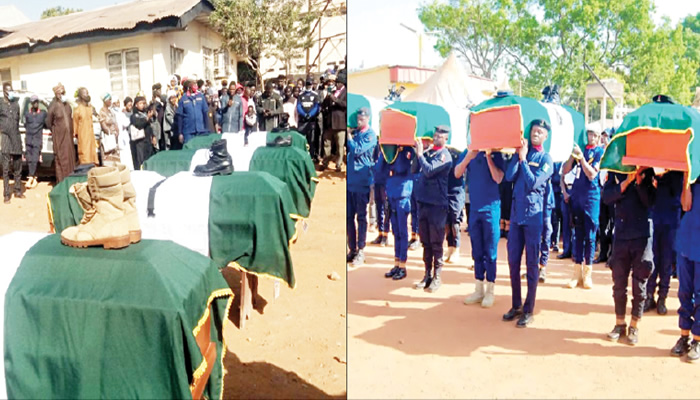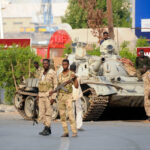
Security officers have continued to be victims of the killings of non-state actors. GIFT HABIB writes on the killings of the Nigeria Security and Civil Defence Corps in the last five years and recently, and the way forward to curb these killings
Nigeria is witnessing the escalation of violence and conflicts across the board. While the incidents have led to the loss of lives in thousands and destruction of livelihood, it has seemingly overwhelmed Nigeria’s security operatives.
In recent years, insecurity has worsened in many parts of the country. The North-West and North-Central regions are currently experiencing heightened violent conflict between farmers and herders, uncontrollable and well-organised banditry and kidnapping for ransom, as well as pockets of ethnic and religious violence.
The South-West region is also experiencing violence between farming and herders’ communities, leading to attacks and counter-attacks with the loss of lives and property.
The militancy in the South-South region, especially the part of the Niger Delta hosting oil installations and facilities, has remained unabated despite the introduction of the Presidential Amnesty Programme which secured a reduction in attacks on oil facilities. This region continues to experience various forms of insecurity; cultism, land struggles, electoral violence, and gang activities.
The South-East region is also facing a high incidence of killings, kidnapping of traditional rulers, and burning of institutions.
However, there seems to be a recent spike in the killings of security officials in the country. Though Nigeria is not officially at war, the security agents have become vulnerable to attack. They have continued to bear the larger brunt of killings by non-state actors.
Increasingly violent attacks
To curb the increasingly violent attacks on Nigerians, the country’s security personnel are sent to carry out operations in many parts of the country, especially in the northern part of the country.
In Nigeria, security officers such as the Nigeria Police Force, the military, etc are killed in their line of duty, without as much formal investigation to find out what happened. The conspiracy of silence is indicative of the fundamental malfunctioning security structure in the country. There are lessons other security personnel will take from this ill development.
The data obtained from the Council on Foreign Relations’ Nigeria Security Tracker, a website that tracks violent incidents related to political, economic, and social grievances directed at the state or other affiliated groups, said that in 2022, non-state actors killed 138 policemen in eight months in Nigeria.
Other countries in the world would not tolerate the level of disregard for the lives of security personnel. Instead of immediate action to fish out the perpetrators to deter other criminals and re-establish trust in the families and colleagues of those who are in the line of duty, very little seems to be coming out from the government.
The irony, though, is that sufficient attention isn’t paid to the high price these patriots are paying to ensure that the rest of us live in an environment free of stress and hassles. Not a few Nigerians are worried that the casualty level of security and state officials responsible for protecting the citizens and enforcing laws is rising daily.
Officials of the Nigeria Security and Civil Defence Corps, which was commissioned to provide measures against threats and any form of attack or disaster against the nation and its citizenry, are not spared either by non-state actors at the slightest opportunity.
The NSCDC, a paramilitary institution in Nigeria, is statutorily empowered by lay Act No. 2 of 2003 and amended by Act 6 of June 4, 2007.
According to the data made available to our correspondent by the corps spokesperson, Olusola Odumosu, 344 of its officers have lost their lives while on duty from 2018 to date.
Odumosu said the personnel were killed “as a result of bandit attacks or insurgency.”
According to the data, 67 NSCDC operatives were killed in 2018; 60 lost their lives in 2019; 70 in 2020; 127 in 2021; nine in 2022, and 11 in 2023.
On January 9, 2023, the corps expressed sadness over the death of seven of its officers ambushed and killed at the Kuriga mining site in the Birnin Gwari Local Government Area of Kaduna State.
On April 30, 2022, two personnel of the corps were reportedly killed in an attack in Makurdi, Benue State capital. It was reported that the security personnel, who were on duty, were waylaid and killed by suspected armed herders at the waterside of the Nyiongu community on the outskirts of Makurdi.
On May 22, 2021, two NSCDC officers were killed following an attack by gunmen at a security outpost in Umueri, Anambra East Local Government Area of Anambra State.
On December 12, 2020, an NSCDC officer fell to the bullet of gunmen in Oyo State while on official duty to rescue a Lebanese who was kidnapped.
Two personnel of the corps were killed by suspected militants in Rivers State on June 16, 2019, while on February 12, 2018, two officers were found dead in the Guma Local Government Area of Benue State following a gun battle with armed attackers suspected to be herdsmen.
The recent killings of security agents in Nigeria are a cause for serious concern. The security of all citizens should be of paramount importance, and the loss of any member of the security forces is a tragic event that should not be taken lightly. The role of security agents is to ensure the safety and well-being of all citizens, and it is imperative that they are able to do so without fear of being targeted for violence.
Only last month, the NSCDC Commandant General, Ahmed Audi, advised personnel to observe absolute vigilance while carrying out their official duties.
Audi’s advice was a sequel to recent attacks and ambushes by gunmen on personnel in various parts of the country. He frowned at the recent death rate recorded by the corps, saying it was saddening and unfortunate.
The CG stressed the need for officers and men of the corps to apply intelligent surveillance before embarking on road trips.
Although the commandant-general said the personnel could not avoid fulfilling their statutory duties, he, nonetheless, maintained that it was essential for the personnel to “watch before you leap. Use sirens when necessary but not to alert the criminals who might be on the watch out.
“Ensure that you stay alive because that is the only way you can perform your duties as security operatives. This does not, however, mean that you should run away when you are meant to defend citizens and the country; it is only a warning to observe intelligent watch-out during official duties.”
He further advised the personnel to collaborate with other security agencies, especially in information sharing.
Agency demands compensation
Speaking on what could be done to address the menace, Odumosu said there should be adequate compensation for the families of security personnel killed on duty.
“Special incentives must be given to families of slain officers to encourage others who would be sent to war zones; just like what the CG did to the families of the slain officers in Kaduna in January where cheques of an undisclosed amount of money were presented to their next of kins as a token of support pending the payment of their accrued benefits. Also, one slot for each family as a replacement for the slain officers was approved.
“The government must put in enough funds for the training and retraining of security personnel across the country. Security personnel must be trained in the latest tactics and techniques for dealing with terrorist groups and other criminal elements.
“Security personnel must be properly equipped always ahead of any incident. They need to be more proactive instead of reactive. They should be able to react swiftly to intelligence reports to forestall future attacks from ambush by non-state actors.
“The government must address the underlying social and economic issues that are fueling the violence,” Odumosu stated.
Also, a security expert and Chief Executive Officer of Beacon Consulting Limited, Kabiru Adamu, stated that security personnel must be properly kitted and protected so that non-state actors would not take advantage of them.
Adamu noted that security officers must have close relationships with communities to ensure their safety when the chips are down.
The security expert explained, “The best thing is to find out who is targeting them and why they are being targeted by those elements. The NSCDC officers have been targeted by non-state criminal groups.
“However, some ways to reduce the killing of these officers are first, every NSCDC officer must be protected. They should be properly kitted. Some of these personnel do not have fitted body kits to protect them, especially their chest and then their heads (helmets).
“It will take a multi-faceted approach to address the problem of killings of security agents in Nigeria. This will require the cooperation and support of government officials, security agencies, community leaders, and citizens alike.
“The security personnel must have a good relationship with communities to provide safety or shelter when any ugly incident arises.”





